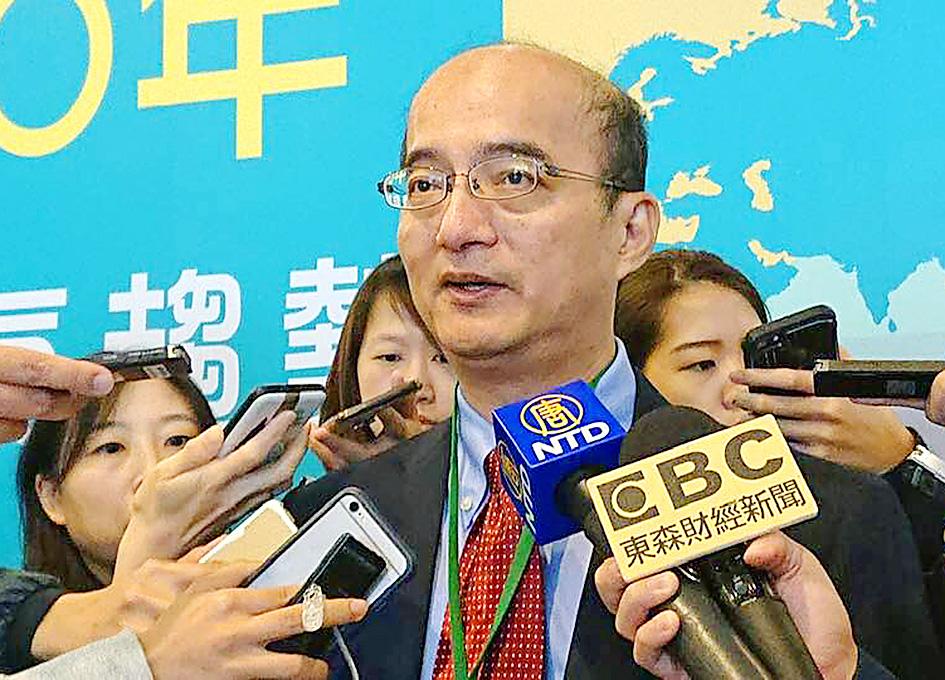Taiwan has become a leader in the global supply chain, as an increasing number of its overseas companies have been investing more funds at home, economists said on Saturday.
Taiwan Institute of Economic Research (TIER, 台灣經濟研究院) president Chang Chien-yi (張建一) said that the government’s incentive programs for Taiwanese investors, launched last year, have attracted many top-tier Taiwanese manufacturers to return.
In their wake, second and third-tier industries have also returned, helping the nation reshape its production structure, Chang said.

Photo: CNA
“The move by these Taiwanese investors to come home has helped Taiwan assume the position of commander, or the brain, of the global supply chain,” he said. “This development is expected to boost Taiwan’s status in global trade.”
The incentive programs were launched as companies were seeking to move some of their production out of China to avoid the US’ increased tariffs on Chinese-made products during a trade dispute.
As of Friday, 473 Taiwanese companies have pledged to invest a combined NT$989.1 billion (US$33.1 billion) in the home market under the incentive programs, while 56 more are waiting for approval, the Ministry of Economic Affairs said.
Even Taiwanese companies that operate businesses in China and Southeast Asian countries have been able to use Taiwan as a hub while mapping out global expansion strategies to meet the needs of various clients, Chang said.
Earlier last week, Minister Without Portfolio Kung Ming-hsin (龔明鑫) said that NT$200 billion of the nearly NT$1 trillion in pledged returning funds had been invested last year.
Companies this year are expected to invest an additional NT$325.3 billion, which amounts to 1.7 percent of the nation’s NT$19 trillion GDP and boosting the economy, Kung said.
Taiwan’s GDP grew 1.54 percent in the first quarter of the year, outperforming many nations as the global economy was being affected by the COVID-19 pandemic, the Directorate-General of Budget, Accounting and Statistics said.
Pledged investments are expected to reach about NT$500 billion this year, which would improve Taiwan’s status in the global supply chain, the ministry said.
Listed manufacturers’ combined sales last year fell 2.8 percent from a year earlier to NT$16.5 trillion amid the US-China trade dispute, the ministry said.
Their total net income fell 19.8 percent annually to NT$1.23 trillion, it said.
However, manufacturers’ spending on research and development (R&D) last year rose 7.9 percent to a five-year high of NT$460.8 billion, with the electronic components industry spending the most at NT$266.3 billion, followed by the computer and optoelectronics industry at NT$123.8 billion, according to ministry data.
The two industries accounted for 84.7 percent of total R&D spending in Taiwan’s manufacturing sector last year, the ministry said.

KEEPING UP: The acquisition of a cleanroom in Taiwan would enable Micron to increase production in a market where demand continues to outpace supply, a Micron official said Micron Technology Inc has signed a letter of intent to buy a fabrication site in Taiwan from Powerchip Semiconductor Manufacturing Corp (力積電) for US$1.8 billion to expand its production of memory chips. Micron would take control of the P5 site in Miaoli County’s Tongluo Township (銅鑼) and plans to ramp up DRAM production in phases after the transaction closes in the second quarter, the company said in a statement on Saturday. The acquisition includes an existing 12 inch fab cleanroom of 27,871m2 and would further position Micron to address growing global demand for memory solutions, the company said. Micron expects the transaction to

Vincent Wei led fellow Singaporean farmers around an empty Malaysian plot, laying out plans for a greenhouse and rows of leafy vegetables. What he pitched was not just space for crops, but a lifeline for growers struggling to make ends meet in a city-state with high prices and little vacant land. The future agriculture hub is part of a joint special economic zone launched last year by the two neighbors, expected to cost US$123 million and produce 10,000 tonnes of fresh produce annually. It is attracting Singaporean farmers with promises of cheaper land, labor and energy just over the border.

US actor Matthew McConaughey has filed recordings of his image and voice with US patent authorities to protect them from unauthorized usage by artificial intelligence (AI) platforms, a representative said earlier this week. Several video clips and audio recordings were registered by the commercial arm of the Just Keep Livin’ Foundation, a non-profit created by the Oscar-winning actor and his wife, Camila, according to the US Patent and Trademark Office database. Many artists are increasingly concerned about the uncontrolled use of their image via generative AI since the rollout of ChatGPT and other AI-powered tools. Several US states have adopted

A proposed billionaires’ tax in California has ignited a political uproar in Silicon Valley, with tech titans threatening to leave the state while California Governor Gavin Newsom of the Democratic Party maneuvers to defeat a levy that he fears would lead to an exodus of wealth. A technology mecca, California has more billionaires than any other US state — a few hundred, by some estimates. About half its personal income tax revenue, a financial backbone in the nearly US$350 billion budget, comes from the top 1 percent of earners. A large healthcare union is attempting to place a proposal before